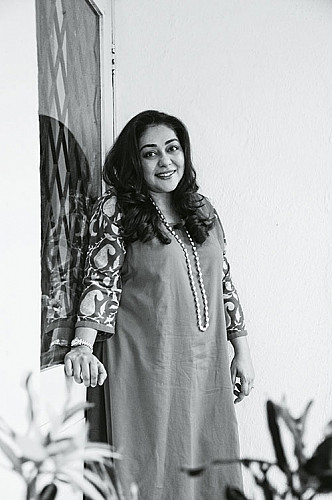Power Inheritor: Meghna Gulzar
Her father has been one of India’s greatest poets, with five National Film Awards (three for direction) in his kitty. Her mother, a top actress in the ’70s and ’80s, has been lauded for several critically-acclaimed performances. It’s no wonder then that Gulzar and Rakhee’s only child would make her mark in the world of cinema. Meghna Gulzar — who made her debut as a director with Filhaal, a film on surrogacy — helmed Talvar, 2015’s most hard-hitting film. Based on the Aarushi and Hemraj double murder case that held the nation’s attention for years, the movie struck gold at the box office, and was a favourite at film festivals. We’re waiting with bated breath for her next one.
“When you see people admiring your parents or adulating them, you get a fair idea of how appreciated they are in their professional spheres. But at the end of the day, they are a mother and a father at home. My upbringing was fairly normal and there were no excesses. My mother was quite a disciplinarian and kept me rooted, though my father would pamper me a lot. Apart from the fact that they were separated, I don’t think there was anything out of the ordinary in my childhood.”
“By the time I grew up, I was clear I wanted to be a film-maker, or do something in the visual field. It’s quite a coincidence, but I tend to gravitate towards content which is somewhere rooted in the society that we live in. There needs to be a connection — I get drawn to subjects that I hope resonate with the society that we’re making films for. I feel this is important.”
“I wanted to bring Talvar to the big screen because cinema is a very powerful medium. There was so much haze around this case, with different kinds of conflicting information. What we tried to do is present it all in a manner where some kind of clarity could be achieved — or at least start the process for the same. The case still lacks closure; there’s a sense of incompleteness around it. We hoped that when we laid out all the facts and perspectives in a comprehensive manner — it’s been eight years since the incident and yet information came sporadically — things would become clearer.”
“The biggest challenge was the huge responsibility we had, which happens when you’re making a film about a real case. The people concerned are very much alive, and there is a fine line between being critical and being derogatory. You need to observe and express objectively, which is not easy. It’s a subject that everyone thinks they know everything about, or at least claims to do so. It was quite a tightrope walk for us!”
“Being selected at TIFF (Toronto International Film Festival) was the first break we had. And after the cinema release, the way the audience appreciated the film; our shows being increased on a Monday — which never happens with a film of this genre; the critics with their positive reviews…all of it was extremely gratifying. It took me a while to believe it — sometimes I thought it’s happening to someone else! It was very motivating.”
Read about our next power woman, Anuradha Roy.
Related posts from Verve:
Verve Trending
Sorry. No data so far.
us on Facebook to stay updated with the latest trends






